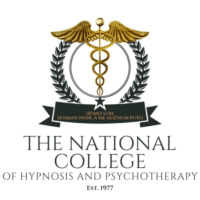
Hypnotherapy
Hypnosis is a skilled communication aimed at directing a person’s imagination in a way that helps elicit changes in perceptions, sensations, feelings, thoughts and behaviours.
Hypnotherapy, the clinical application of hypnosis assists clients in resolving issues arising from emotions, behaviour or thoughts and/or to maximise their potential. In a typical session the therapist and client discuss the therapeutic goals desired and the therapist works with the client to achieve those aims.
Hypnotherapy has a system of voluntary self-regulation through the Complementary and Natural Healthcare Council. Graduates of our hypnotherapist pathway can apply for registration with the CNHC and work with the public.
Hypnotherapists however are not trained to deal with deep psychological issues or psychiatric illness.
Hypno-Psychotherapeutic Counselling
Psychotherapeutic counselling differs from traditional counselling in that the in-depth therapeutic relationship created jointly by client and therapist is emphasised as central and key to the process.
We teach it in a similar integrative way to all our pathways, covering a range of therapeutic approaches in a holistic context (along with full training in hypnotherapy), taking into account the client’s mind, body and soul in the context of their lived experience.
The training helps you also understand yourself at a deeper level while exploring how to create and support the therapeutic relationship while you develop advanced skills in working with emotional, thought and behavioural issues. Your qualities as therapist in your interaction with the client are essential to both the process and the outcome.
Psychotherapeutic counselling is often longer term than traditional counselling, not exclusively based on support and not primarily solution-focused. It’s a form of depth psychotherapy where you help the client explore themselves for a greater understanding of, and insight into, their real self.
It fosters a deep understanding of emotions by looking at childhood and the roots of beliefs, personality and identity, seeking causes rather than focusing on symptom relief.
Within a safe and supportive environment, psychotherapeutic counselling deals with more complex issues that have developed over a client’s life. It’s an interactive approach based on relational methodology with the sovereignty of the individual’s experience and their personal complexity at its heart.
Hypno-Psychotherapy
Psychotherapy is defined by UKCP as a process “to help clients gain insight into their difficulties or distress, establish a greater understanding of their motivation, and enable them to find more appropriate ways of coping or bring about changes in their thinking and behaviour. Psychotherapy involves exploring feelings, beliefs, thoughts and relevant events, sometimes from childhood and personal history, in a structured way.”
Hypno-psychotherapy is the clinical application of hypnosis to enhance psychotherapeutic interventions. Our hypno-psychotherapists are trained at Master’s level and are trained to deal with deep psychological issues. The training includes psychodynamic, behavioural and person-centred approaches.
Hypno-psychotherapy has a long history with the use of hypnosis in a clinical setting dating back to the 18th and 19th centuries. We teach you to use clinical hypnosis as an addition to your psychotherapy training, enabling you to work more effectively with your clients and their unconscious processes.
Our training moves beyond hypnotherapy to meet the UKCP requirements for hypno-psychotherapy. In other words we consider hypnotherapy and hypno-psychotherapeutic counselling to be subsets of hypno-psychotherapy.
Your Choice of Title
Once qualified on our hypno-psychotherapy pathway you can practice either under either the title hypno-psychotherapist or alternatively as an integrative psychotherapist depending on your preference, This is possible because we teach psychotherapy in an integrative way, with hypnosis as a part of that model. Some psychotherapy work with clients will rely heavily on the use of hypnosis and sometimes it will not be necessary.
This optionality enables you to combine different approaches to tailor a unique fit for your client rather than the client being fitted into one therapeutic model. We find this approach is more effective, respecting diversity in clients, what they bring to therapy and connecting with them more fully to offer an outcome aligned with their belief system and sense of self.
Diversity in your clinical tool box doesn’t mean training is less thorough. You emerge from it well-versed, competent and confident to use the most effective methods in traditional and modern psychotherapy and able to offer the right approach for your client.
Qualification as a hypno-psychotherapist (or integrative psychotherapist) includes all the training included in the hypnotherapy and hypno-psychotherapeutic counsellor pathways but adds the further element of supported research in your individual area of specialism or interest. It is the highest level of accreditation that we offer.
Flexibility Built In
You can become a hypnotherapist without continuing to UKCP registration. That is a valid choice and we support you in that choice just as we support you if you continue. Our courses are fully flexible to accommodate your needs and preferred way of study.
Graduates of our hypno-psychotherapist and hypno-psychotherapeutic counsellor pathways become members of the UKCP College of Outcome Oriented and Hypno-Psychotherapies and can use the letters ADHP(NC) or ADHPC(NC).
We Know What Clients Look For
People are more aware than ever of what should be expected from a complementary medicine or psychotherapy practitioner. Demand for therapeutic services is ever increasing, as is awareness of the availability of help.
When looking for a therapist people increasingly need to be assured that the practitioner has completed an accredited training and belongs to a recognised professional association which requires members to adhere to a code of ethics, has a complaints procedure and requires members to be in ongoing clinical supervision.
At NCHP we have taken these factors into consideration and created a series of career pathways that lead to registration and accreditation with the appropriate governing bodies, opening the doors to career success and personal fulfillment.
